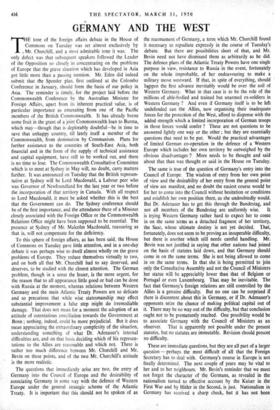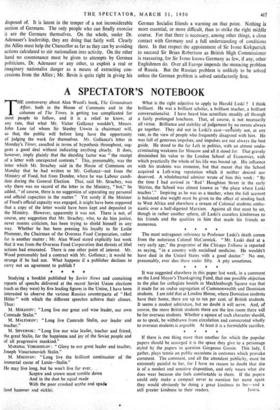GERMANY AND THE WEST
TeHE tone of the foreign affairs debate in the House of Commons on Tuesday was set almost exclusively by Mr. Churchill, and a most admirable tone it was. The only defect was that subsequent speakers followed the Leader of the Opposition so closely in concentrating on the problems of Europe that the grave situation which has developed in Asia got little more than a passing mention. Mr. Eden did indeed submit that the Spender plan, first outlined at the Colombo 'Conference in January, should form the basis of our policy in Asia. The reminder is timely, for the project laid before thi Commonwealth Conference by the Australian Minister for Foreign Affairs, apart from its inherent practical value, is of particular importance as emanating from one of the Pacific members of the British Commonwealth. It has already borne some fruit in the grant of a joint Commonwealth loan to Burma, which may—though that is deplorably doubtful—be in time to save that unhappy country, till lately itself a member of the Commonwealth, from domination by Communism. Plans for further assistance to the countries of South-East Asia, both financial and in the form of the supply of technical assistance and capital equipment, have still to be worked out, and there is no time to lose. The Commonwealth Consultative Committee which is to meet at Sydney in May will, no doubt, carry matters further. It was announced on Tuesday that the British represen- tative at Sydney will be Lord Macdonald, a Labour peer who was Governor of Newfoundland for the last year or two before the incorporation of that territory in Canada. With all respect to Lord Macdonald, it must be asked whether this is the best that the Government can do. The Sydney conference should be of the first importance, and the attendance there of a Minister closely associated with the Foreign Office or the Commonwealth Relations Office might have been supposed to be essential. The presence at Sydney of Mr. Malcolm Macdonald, reassuring as that is, will not compensate for the deficiency.
To this sphere of foreign affairs, as has been said, the House of Commons on Tuesday gave little attention, and in a one-day . debate it was perhaps wise to dwell almost wholly on the grave problems of Europe. They reduce themselves virtually to two, and on both all that Mr. Churchill had to say deserved, and deserves, to be studied with the closest attention. The German problem, though in a sense the lesser, is the more urgent, for the reason that to all appearance little good or bad can be done with Russia at the moment, whereas relations between Western Germany and the main Atlantic Treaty Powers are so delicate and so precarious that while wise statesmanship may effect substantial improvement a false step might do irremediable damage. That does not mean for a moment the adoption of an attitude of ostentatious conciliation towards the Government at Bonn ; nothing, indeed, could be more prejudiCial. But it does mean appreciating the extraordinary complexity of the situation, understanding something of what Dr. Adenauer's internal difficulties are, and on that basis deciding which of his represen- tations to the Allies are reasonable and which not. There is rather too much difference between Mr. Churchill and Mr. Bevin on these points, and of the two Mr. Churchill's attitude is the more realistic.
The questions that immediately arise are two, the entry of Germany into the Council of Europe and the desirability of associating Germany in some way with the defence of Western Europe under the general strategic scheme of the Atlantic Treaty. It is important that this should not be spoken of as the rearmament of Germany, a term which Mr. Churchill found it necessary to repudiate expressly in the course of Tuesday's debate. But there are possibilities short of that, and Mr. Bevin need not have dismissed them as arbitrarily as he did. The defence plans of the Atlantic Treaty Powers have one single purpose in view, resistance to Russia in the event, fortunately on the whole improbable, of her endeavouring to make a military move westward. If that, in spite of everything, should haypen the first advance inevitably would be over the soil of Western Germany. What in that case is to be the role of the millions of able-bodied and trained but unarmed ex-soldiers in Western Germany And even if Germany itself is to be left undefended can the Allies, now organising their inadequate forces for the protection of the West, afford to dispense with the added strength which a limited incorporation of German troops in those forces would confer ? These are not questions to be answered lightly one way or the other ; but they are essentially questions that need to be put. Would the practical advantages of limited German co-operation in the defence of a Western Europe which includes her own territory be outweighed by the obvious disadvantages ? More needs to be thought and said about that than was thought or said in the House on Tuesday.
The same is true of the question of Germany's entry into the Council of Europe. The wisdom of entry from her own point of view and the desirability of her entry from the general point of view are manifest, and no doubt the easiest course would be for her to come into the Council without hesitation or conditions and establish her own position there, as she undoubtedly would.. But Dr. Adenauer has to get this through the Bundestag, and not all members of the Bundestag are uniformly wise: It is trying Western Germany rather hard to expect her to come in on the same terms as a detached fragment of her territory, the Saar, whose ultimate destiny is not yet decided. That, fortunately, does not seem to be proving an insuperable difficulty. but there is another which still needs careful handling. Mr. Bevin was not justified in saying that other nations had joined on the basis of statutes laid down, and that Germany should come in on the same terms. She is not being allowed to come in on the same terms. In that she is being permitted to join only the Consultative Assembly and not the Council of Ministers her status will be appreciably lower than that of Belgium or Portugal or even Luxembourg. That may be inevitable. The fact that Germany's foreign relations are still controlled by the Allies is a genuine difficulty. But no one can be surprised if there is discontent about this in Germany, or if Dr. Adenauer's opponents seize the chance df making political capital out of it. There may be no way out of the difficulty, but that conclusion ought not to be prematurely reached. One possibility would be to associate Germany with the Council of Ministers as an • observer. That is apparently not possible under the present statutes, but no statutes are immutable. Revision should present no difficulty.
These are immediate questions, but they are all part of a larger question — perhaps the most difficult of all that the Foreign Secretary has to deal with. Germany's course in Europe is not finally determined. The next couple of years may be vital to her and to her neighbours. Mr. Bevin's reminder that we must not forget the character of the Germans, as revealed in the nationalism turned to effective account by the Kaiser in the First War and by Hider in the Second, is just. Naticinalism in Germany has received a sharp check, but it has not been disposed of. It is latent in the temper of a not inconsiderable section of Germans. The only people who can finally exorcise it are the Germans themselves. On the whole, under Dr. Adenauer's leadership, they are doing that fairly well. Clearly the Allies must help the Chancellor as far as they can by avoiding actions calculated to stir nationalism into activity. On. the other hand no countenance must be given to attempts by German politicians, Dr. Adenauer or any other, to exploit a real or imaginary nationalist danger as a means of extracting con- cessions from the Allies ; Mr. Bevin is quite right in giving his German Socialist friends a warning on that point. Nothing is more essential, or more difficult, than to strike the right middle course. For that there is necessary, among other thingi, a close contact with Germany and a full understanding of conditions there. In that respect the appointment of Sir Ivone Kirkpatrick to succeed Sir Brian Robertson as British High Commissioner is reassuring, for Sir Ivone knows Germany as few, if any, other Englishmen do. Over all Europe impends the menacing problem of Russia. But the Russian problem is unlikely to be solved unless the German problem is salved satisfactorily first.







































 Previous page
Previous page